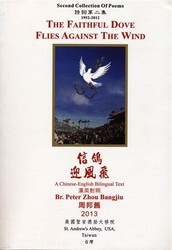Nestled in a spring-fed valley in the desert northeast of Los Angeles, St. Andrew’s Abbey is a long way from its roots in Chengdu. The only living link that remains is Brother Peter Zhou Bangjiu, a 91-year-old Sichuan native who rejoined the abbey in 1985 following his release from a Chinese labor camp.
Peter Zhou Bangjiu, a young aspiring priest, had just taken his vows when the Communist army seized Chengdu in 1949.
Unable to pursue seminary studies, he nevertheless became a defender of the faith and wrote an open letter that was circulated to Catholics around China. For his refusal to join the patriotic church, Zhou was arrested in 1955 and received a 20-year sentence.
Zhou’s sentence was extended twice due to his refusal to repent of his crimes. During one episode of intense interrogation in 1970, he was handcuffed and arm-cuffed for a period of three weeks, his limbs bound painfully behind his back. When guards realized that this torture had permanently disabled Zhou’s right hand, they removed the cuffs and instead shackled his feet. The shackles would remain for five years.
To keep his mind active while in labor camp, he composed poems commemorating various incidents leading up to, and during, his imprisonment. Having no access to paper and pen, he committed these poems to memory. They would eventually number more than 2,000. When Zhou was finally released he began to transcribe them and, later, to translate many into English and French.
Zhou’s poetry provides a prisoner’s-eye view of the turbulent events taking place outside the labor camp. Interspersed with Zhou’s commentary is his hope that he would one day be released, tempered by his insistence that he would not bow to official pressure in order to win his freedom.
When his third appeal for a reconsideration of his sentence was rejected, he mused:
I wielded my pen to upbraid the slanders,
Showing my loyalty once more,
The three thousand words express
My high ideals and my fervent sentiments.
I prefer to sit in the jail cell for the Lord
Until its bottom breaks
Than to bend down![1]
Zhou was finally exonerated and released in 1981 as China’s reform and opening policy brought a new official stance toward religion. In Zhou’s words, “I didn’t change my attitude; they changed their position.”
He later discovered that his missionary brothers had regrouped following their departure from China, not in their native Belgium, but in Southern California. He recorded the joy of their reunion in “Return to My Monastic Home in Triumph.”
With Jesus assisting in fighting,
I had defeated again and again
The struggle meetings, beatings, shackles and handcuffs.
Throwing out my chest,
I departed from prison;
Holding my head high,
I left the country,
Now, finally,
I celebrate my reunion with my monastery![2]

The Faithful Dove Flies Against the Wind by Br. Peter Zhou Bangjiu is available from St. Andrew's Abbey.
Image credit: Bell at St. Andrew's Abbey by Brent Fulton.

Brent Fulton
Brent Fulton is the founder of ChinaSource. Dr. Fulton served as the first president of ChinaSource until 2019. Prior to his service with ChinaSource, he served from 1995 to 2000 as the managing director of the Institute for Chinese Studies at Wheaton College. From 1987 to 1995 he served as founding …View Full Bio
Are you enjoying a cup of good coffee or fragrant tea while reading the latest ChinaSource post? Consider donating the cost of that “cuppa” to support our content so we can continue to serve you with the latest on Christianity in China.